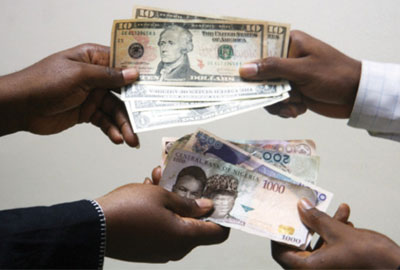Standard & Poor’s, a ratings agency based in the United States, expects the Central Bank of Nigeria (CBN) to devalue the naira at some stage in 2016 and in gradual adjustments.
Despite two devaluations of the local currency in late 2014 and early 2015, investors continue to clamour for further devaluation in the light of worsening macroeconomic realities partly caused by the tumble in crude oil prices.
Investors in the equities market continue to offload their stakeholding at the Nigerian Stock Exchange (NSE) for fear over the state of the economy.
Foreign investors offloaded 513.85 billion stocks valued N1.025 trillion ($2.58 billion) last year, compared with N1.538 trillion at the end of 2014, according to data from the NSE.
The latest data reflect the sharp decline in the local market last year, when stocks fell by 17.36 per cent as oil prices plummeted and naira value nose dived.
Most of the selling was by foreign investors, who account for 53.79 percent of activity in the market.
Despite the growing pressure, the CBN has kept the naira pegged at around N198 to the dollar on the official interbank market, while restricting access to dollars. Last week, the naira hit a low of N305 to the dollar on the parallel market.
“Their line has been to try to hold it as much as possible, and they are trying to continue that policy … alongside the restrictions on imports as well,” Reuters quoted Ravi Bhatia, director of sovereign and international public finance at Standard & Poor’s as saying.
“But at some point they are going to have to move, but I think they are going to try and do it incrementally and not (in) big jumps,” he said, adding he expects this to happen in one or two increments.
Nigerian non-deliverable currency forwards, a derivative product used to hedge against future exchange rate moves, indicated markets expected the naira exchange rate at N265 to the dollar in six months’ time, and at N284 to the dollar in 12 months’ time.
Brent crude accounts for about 95 percent of foreign earnings. A devaluation would only go some way to improve Nigeria’s situation, Bhatia said.
“It will help a little, but the problems aren’t going to go away – there is no easy avenue for them really.”
He sees government talk of shifting to non-oil revenue as “overstated” and not easy to do. “Nigeria is going to face a very tough year in 2016.”














